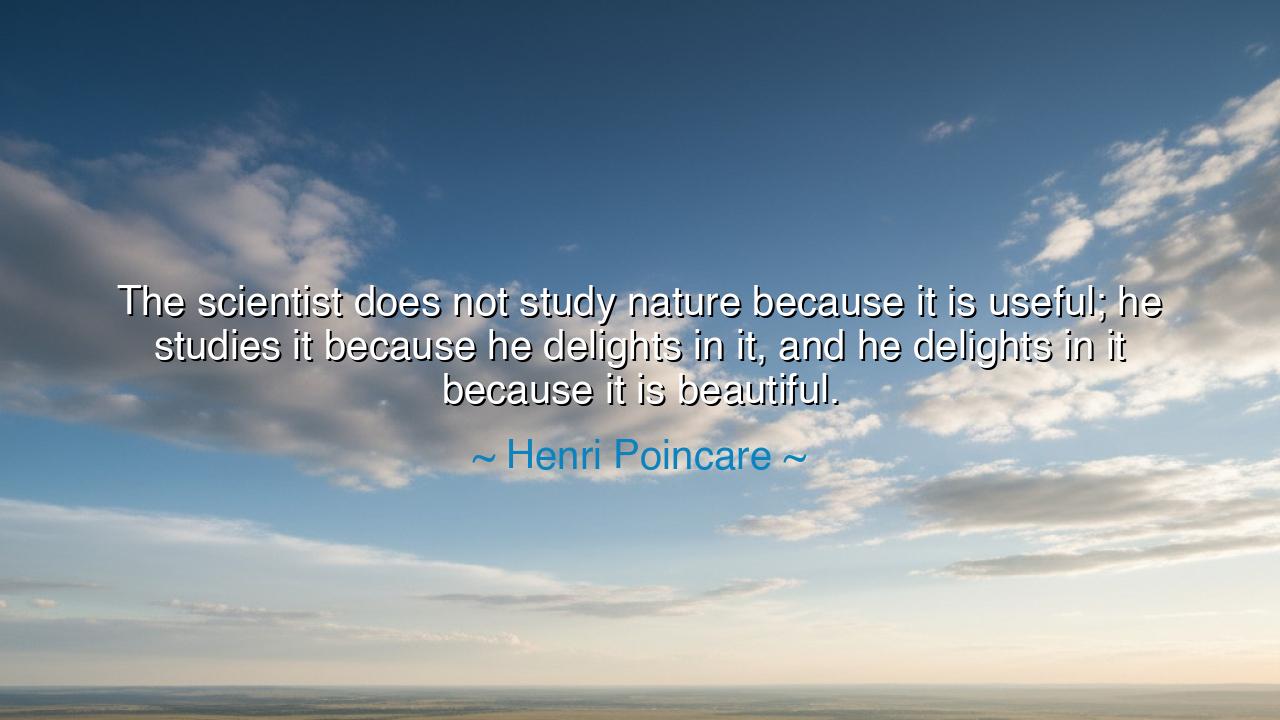
The scientist does not study nature because it is useful; he
The scientist does not study nature because it is useful; he studies it because he delights in it, and he delights in it because it is beautiful.






The words of Henri Poincaré—“The scientist does not study nature because it is useful; he studies it because he delights in it, and he delights in it because it is beautiful”—speak with the voice of timeless wonder. Here, the pursuit of science is framed not as a utilitarian endeavor, but as an act of reverence, curiosity, and aesthetic appreciation. The scientist, in Poincaré’s vision, is drawn to the patterns, forms, and mysteries of nature by an inner delight, a joy that transcends practical application and rests upon the perception of beauty itself.
The meaning of this reflection is profound: knowledge and utility are not the primary engines of discovery. True inquiry is born of delight, a passionate engagement with the harmony and elegance of the world. A scientist who studies only for gain or pragmatic ends misses the higher purpose: to see the order, symmetry, and artistry that infuse nature at every scale—from the spirals of galaxies to the curve of a wave. Beauty, not merely function, is the guide that illuminates the path of understanding.
History provides abundant testimony to this principle. Consider Isaac Newton, whose delight in observing an apple’s fall led to the universal law of gravitation. Though the practical applications of his discoveries would later transform the world, Newton’s own motivation was the aesthetic wonder of seeing the cosmos obey simple and elegant laws. His joy in the hidden harmony of motion and force exemplifies Poincaré’s teaching: the scientist studies nature first for its own beauty, and through this joy, deeper understanding unfolds.
Similarly, the life of Albert Einstein reveals this devotion to beauty. He spoke often of the harmony of physical laws, of the elegance that made the universe comprehensible. His delight was not in practical engineering, but in the intellectual and aesthetic pleasure of understanding the curves of space-time. The practical consequences, from nuclear energy to GPS systems, were secondary to the profound satisfaction of witnessing the universe’s exquisite order.
The lesson, O seekers of wisdom, is that the pursuit of knowledge is most noble when motivated by joy and wonder rather than mere utility. When we delight in the patterns of life, in the structure of thought, or in the mysteries of existence, we align ourselves with a deeper truth: beauty and comprehension are inseparable. To study nature, or any discipline, primarily for gain is to blind ourselves to the richness of experience; to study for delight is to awaken the soul.
Practically, this means nurturing curiosity and wonder in all endeavors. Observe the natural world without haste, without expectation, allowing yourself to marvel at its intricacies. Approach learning with passion rather than obligation. Whether in mathematics, music, literature, or science, seek the elegance, the symmetry, the hidden harmony. In doing so, delight becomes both compass and reward, guiding discovery while enriching the spirit.
Thus let it be inscribed upon the scrolls of memory: the scientist, and indeed every seeker of knowledge, should be motivated by the beauty of nature. Henri Poincaré reminds us that practical utility is a secondary gift; the first gift is delight. By embracing this joy, by cultivating reverence for harmony and elegance, we not only uncover truths but also participate in the eternal artistry of creation itself. Knowledge pursued with delight becomes wisdom, and wisdom, in turn, is a bridge to the divine.






AAdministratorAdministrator
Welcome, honored guests. Please leave a comment, we will respond soon